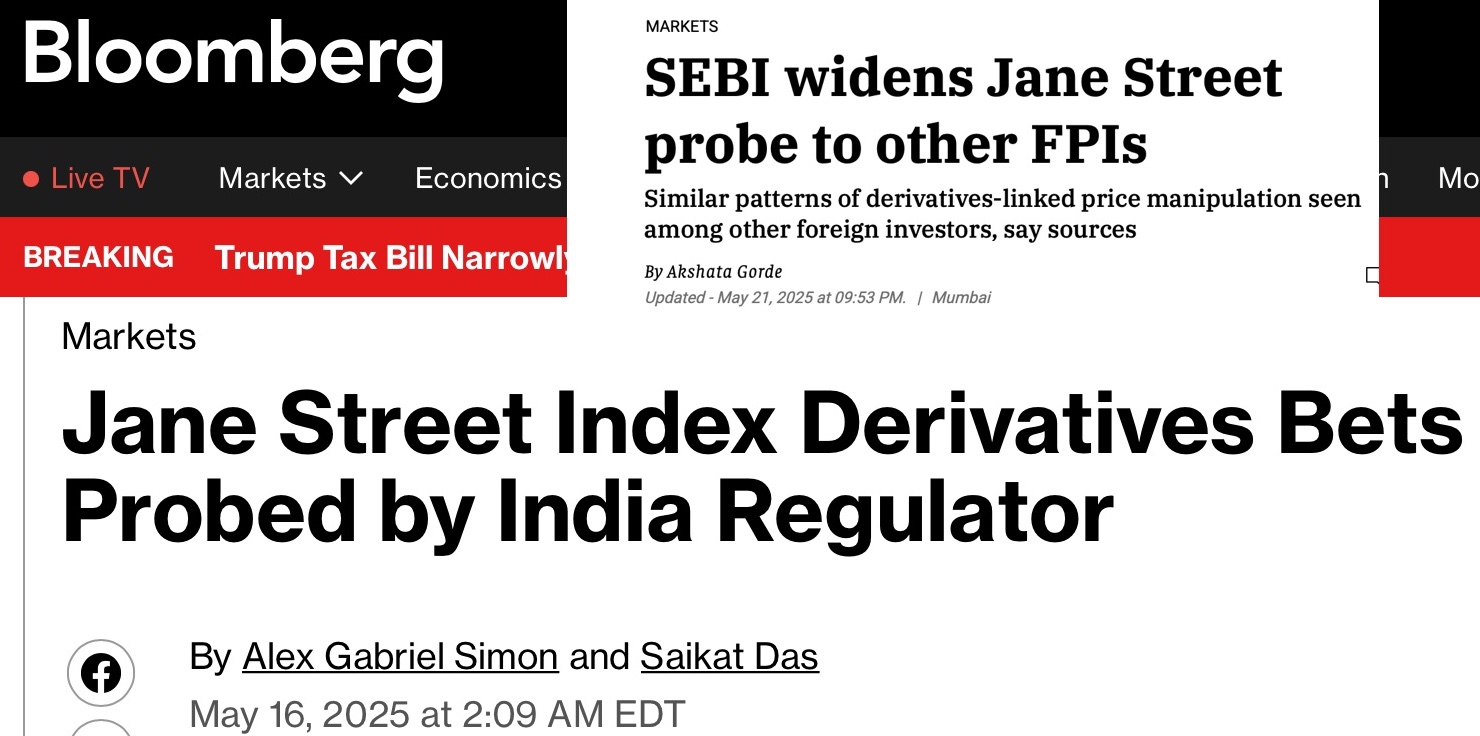Jane Street is under the scanner for allegedly exploiting Dalal Street and profiting at the expense of retail investors. The firm reportedly made over ₹50,000 crore through trades on the NSE and BSE, primarily from derivatives. While some are calling this a case of financial manipulation, others argue it’s simply the result of strategic trading backed by deep pockets. The Securities and Exchange Board of India (SEBI) has begun investigating Jane Street’s activities and extended its probe to other Foreign Portfolio Investors (FPIs) as well.
This write-up explores Jane Street’s trading strategy and its implications for smaller market participants.
The Stock Market: A Zero-Sum Game
We must first understand that the stock market is inherently a zero-sum game: for every gain, there’s an equivalent loss. In such an environment, success is often determined not just by strategy, but by the ability to deploy capital effectively. Jane Street employed a textbook trading strategy known to many, but its execution required immense financial firepower—something most retail investors lack. This strategy spanned across all three segments of the market: cash, futures, and options.
Market veterans and analysts often cite that an increase in open interest along with a rise in derivative premiums signals bullish sentiment. Anchors like Anil Singhvi regularly highlight how movements in the derivatives market often precede those in the cash segment.
Jane Street’s Playbook
Jane Street reportedly took massive positions in futures and options—completely within the bounds of what is legally permitted. Open interest limits exist at the client, broker, and stock/index level, and these are monitored by exchanges like the NSE. However, it’s possible to circumvent these limits by splitting positions across multiple brokers.
After taking large derivative positions, the next objective was to move the underlying stock or index in the desired direction—typically upward. How? This could be done via news flow, supply-demand manipulation (like spoofing), or through actual buying in the cash market. Jane Street appeared to prefer the legitimate method: actual cash buying.
An Illustrative Example: Dr. Reddy’s Labs (DRREDDY)
Suppose DRREDDY is trading at ₹1,200. Jane Street takes the following positions:
* *Futures*: 10,000 lots (1 lot = 625 shares) = 62,50,000 shares @ ₹1,202
* *Options*: 10,000 lots of 1220 call @ ₹3 = 62,50,000 shares
They then purchase ₹50 crore worth of DRREDDY in the cash segment. If the stock price rises by 10% to ₹1,320, the profits would be:
* *Futures*: 62,50,000 x ₹118 = ₹73.75 crore
* *Options*: 62,50,000 x ₹97 = ₹60.62 crore
* *Total Profit*: ₹134.37 crore
So, an investment of ₹50 crore in the cash market results in a return of over ₹134 crore—a striking example of how derivatives can be leveraged with cash market activity.
Scaling the Strategy to Index Derivatives
Jane Street reportedly used a similar approach with index derivatives, particularly on expiry days. They would take large positions in Nifty, Bank Nifty, or Fin Nifty futures and options. To influence index levels, they would buy index-heavy stocks like HDFC, ICICI Bank, Axis Bank, and SBI in the cash market. For instance, a Bank Nifty call option bought at ₹0.30 and sold at ₹300 could generate enormous gains if the index is moved strategically.
These aggressive moves, especially on expiry days, often resulted in dramatic index swings—driven largely by players with deep pockets and sharp execution like Jane Street.
Was There Any Regulatory Breach?
So, did Jane Street violate any laws? Based on current evidence and market rules, likely not. There are no limits on how much one can buy in the cash segment, though certain disclosures are required beyond specified thresholds. In derivatives, open interest limits exist, but enforcement—especially in options on expiry day—is tricky. Moreover, using multiple brokers can dilute visibility and evade caps.
In truth, Jane Street and similar FPIs thrive in India due to lax regulations, a relatively shallow market, and the presence of uninformed retail traders. They’re not necessarily breaking the rules—they’re just better at playing the game.
Final Thoughts
SEBI’s announcement of a potential “fraud” investigation may be more about appeasing public sentiment than addressing any real wrongdoing. Retail traders must recognize their vulnerability in a market dominated by institutional giants. This isn’t fraud—it’s a stark example of market Darwinism.
The stock market is a battlefield, and those with the most firepower often win.



